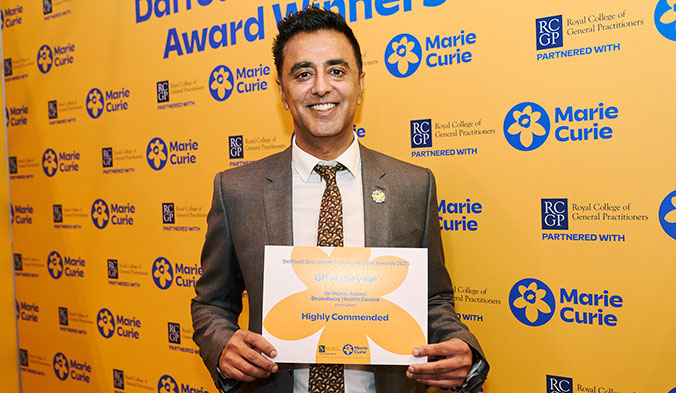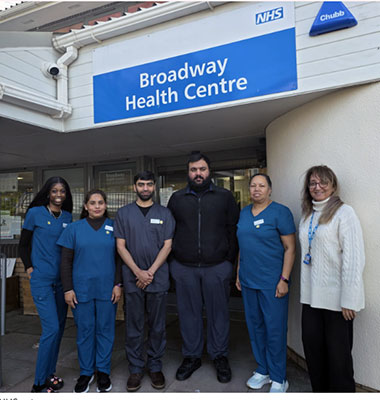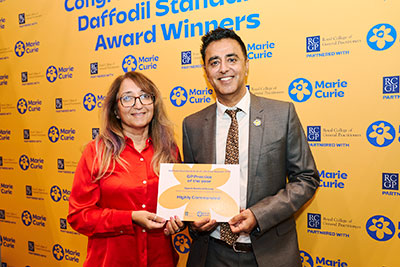Additional case studies
Daffodil Standards - Addressing Inequalities in End of Life Award winner
GP-led homeless palliative care MDT delivering choice, comfort and “one-team” care in hostels and beyond in Liverpool
People experiencing homelessness often die young, with multiple long-term conditions, frailty, and significant barriers to accessing palliative and end of life care. Too often, this results in late identification, repeated crisis admissions, and death in hospital—despite many people wishing to remain in a familiar place, with people they trust.
This Daffodil Standards award-winning work showcases a pioneering Homeless Palliative Care MDT, formed through collaboration between a Brownlow Health Homeless Palliative team, Liverpool and a Marie Curie Hospice. The service uses assertive outreach and multi-agency coordination to provide care where the person is—often a hostel—ensuring there is “only one chance to get it right.”
Why this work was needed: stark inequality in access and outcomes
The team was created after recognising poor care and outcomes for people experiencing homelessness at end of life, including exclusion from mainstream palliative care pathways.
People experiencing homelessness may fear:
- dying alone
- being somewhere they are not known or respected
- inadequate symptom control, especially alongside addiction
- prior negative experiences being repeated
The MDT model was designed to respond to these realities with practical, compassionate, person-centred care, delivered in settings that feel safe for the patient.
Leadership, collaboration and model of care
A dedicated working group established the service and then embedded it through:
- Funding for a Homeless Palliative Care Nurse (initially 2 days/week; extended beyond the first year)
- A monthly Homeless Palliative Care MDT, involving:
- GPs and nurses working in homelessness
- palliative care consultants and specialist nurses
- hospital palliative care teams
- allied health professionals
- Outreach to deliver care in hostels and other community settings
- Education for clinical staff and homeless/hostel workers to strengthen early identification and confidence
- Structured reflective practice after death, supporting hostel teams and peers
- Strong links with hospital palliative care to enable smoother transitions into and out of hospital
Daffodil Standards alignment
This service demonstrates how the Daffodil Standards can drive equity-focused, whole-pathway improvement.
Directly addressed
- Standard 2: Early identification (assertive outreach; earlier recognition of deterioration)
- Standard 3: Carer support (support for hostel staff, friends, peers and residents)
- Standard 4: Seamless, planned, coordinated care (multi-agency MDT; care delivered across hostels/hospital/community)
- Standard 5: Assessment of unique needs (tailored care in addiction/hostel context; holistic planning)
- Standard 6: Quality care in the last days of life (symptom control; enabling planned, dignified deaths in hostels)
- Standard 7: Care after death (reflective practice; support for hostel teams and peers after a death)
- Standard 8: GP as hubs within compassionate communities (GP-led MDT anchoring outreach and coordination)
Indirectly strengthened
- Standard 1: Professional and competent staff (education, confidence-building across GP/hostel/community teams)
What changed: assertive outreach plus coordinated planning
Earlier identification and stronger engagement with palliative care
Using outreach to identify signs of deterioration and start earlier conversations, the team achieved substantial improvements over four years (two 2-year audit cycles). Outcomes included:
- Identification on GSF increased from 31% to 90%
- Regular palliative care reviews increased from 13% to 90%
- Preferred Place of Care/Death documented increased from 19% to 70%
- DNACPR in place increased from 19% to 75%
As planning and coordinated support improved:
- Hospital deaths decreased from 66% to 38%
- Deaths in usual residence increased from 17% to 52%
These are not just statistics—they represent people being able to die with greater comfort, dignity, and choice.
Innovation: first UK service to safely use syringe drivers in hostels
A major breakthrough was enabling high-quality symptom control in hostel settings, including use of syringe drivers—reported as the first service nationally to do this safely in hostels, with multiple successful uses to date.
This required:
- building trust and shared confidence with community providers
- addressing fears about clinical risk in “non-traditional” settings
- clear coordination across district nursing, palliative specialists, and hostel staff
Feedback from a District Nursing team captured the essence of the approach:
“This is a superb example of services working together… Your involvement has been an inspiration to our team.”
Compassion and real-world impact
A qualitative review (completed in 2023) highlighted improvements in:
- person-centred care and achieving preferred place of death
- more appropriate hospital admissions
- symptom management
- supporting friends and other residents (often the closest “family” available)
- multi-agency communication and a “one-team culture” with hostel staff and partners
Testimonies described dignity, gratitude, reassurance—and reduced fear among patients and staff.
Learning, dissemination and national influence
The team has prioritised spread and sustainability, sharing learning through education and a national community of practice, including:
- establishing an NIHR-funded ECHO Homeless Palliative Care Network (15 meetings to date; 90+ participants nationally)
- teaching palliative care registrars/consultants and hospice teams
- contributing to education for GP registrars, district nurses and wider professional groups
- ongoing work to publish quantitative and qualitative outcomes more widely
National showcase opportunities for general practice teams
This case study demonstrates a replicable model for reducing inequalities by:
- positioning general practice as a hub for multi-agency outreach and coordination
- embedding early identification and proactive planning for people excluded from standard pathways
- enabling high-quality last days care in the person’s chosen setting, including hostels
- treating hostel staff, friends and peers as key carers—supporting them before and after death
- building confidence across systems through education, reflective practice, and shared protocols
Next steps and quality improvement ambitions
Building on success, the team plans to:
- formalise referral pathways from acute hospitals and drug/alcohol services
- develop models that allow people to remain with their own GP while receiving specialist outreach support
- adapt the model for other underserved groups (e.g. people living with HIV), including needs assessment, retrospective audit and lived-experience focus groups
- continue national dissemination and publication
A GP practice in England, signed up to the Daffodil Standards in 2020/2021. Practice is a Primary Care Network (PCN) in its own right.
Key staff and roles include a GP lead for the Daffodil Standards, care coordinators supporting DS activities, salaried GPs and Registrars.
Key Daffodil Standard activities being undertaken
Early identification (DS2)
- Whole practice/ PCN has a clear protocol to follow for identifying and caring for all palliative patients.
- Developed written guidance for the role of the administrative teams who process letters from the hospital to identify new palliative patients.
- Reception staff have training to identify distressed relatives and patients who are deteriorating and have regular contact with the duty clinician to ensure care is provided as soon as the need is identified.
Carer support (DS3)
- Care coordinators contact carers, offering support and signposting to services within the practice and the community.
Seamless, well-planned and coordinated care (DS4)
- MDT has been established, consisting of two palliative care coordinators, a lead GP, administrative support, dietician, frailty practitioners, social prescribers and carer leads.
- Care coordinators developed close working relationships with PCN led district nursing team, community matrons, the ICB led palliative care team, the local hospice social work team, local charities, local well-being services, living well centre and support groups.
Quality care in the last days of life (DS6)
-
Developed a ‘Daffodil line’ – a dedicated phone line which bypasses all call queues and is answered as a priority – which is given to all patients in the last days of life, their relatives, and the district nursing team, to provide direct access to the duty GP, ensuring swift care at the time of need.
-
Patients in the last days of life also receive a supportive phone-call every 3 days.
Bereavement support (DS7)
- ‘Care after death’ protocol developed, to be followed by all team members.
- All relatives receive a condolence call and a sympathy card, signposting to appropriate support.
Differences the Daffodil Standards have made:
- A whole practice/PCN belief that all patients deserve a peaceful, comfortable death and end of life care is something that is a privilege to provide.
- MDT have a shared ethos and strives to provide best possible care to all patients who are nearing the end of their lives.
- Receive regular positive feedback and compliments from relatives of patients who are grateful for the care provided.
- Care coordinators have an extensive unique role in the care of end-of-life patients, providing wellbeing support, befriending, signposting, and listening.
- By having a PCN led team, the practice can ensure dedicated staff are available to patients for mental, physical, and emotional wellbeing support.
Key enablers to implementation of DS:
- Dedicated funding and control over how funding is allocated.
- Dedicated funding for care coordinators.
- GP lead for DS with background, passion and interest in end-of-life care.
- Support staff with personal experience in end of life care.
- Dedicated time.
- Embedding DS in current activities, protocols, and procedures.
Barriers and challenges to implementation of DS:
- Limited training and education around DS.
- Limited awareness of DS.
- No formal recognition for DS activities.
GP Partner, Dr Sarah Swindells ‘We were thrilled to visit the Royal College to receive recognition for the work the practice puts in to End of Life care. It is an integral part of good general practice and something that all our staff are invested in. We are immensely proud of what we do.’
Nominate who you think deserves recognition for delivering outstanding end of life care. Watch award-winning, Portsdown Group Practice, reflect on winning 'GP Practice Team of the Year'.
Portsdown Group Practice
Winners of the Daffodil Standards Awards GP Practice Team of the Year 2023
Winner of the Daffodil Standards Awards 2025 Non-Clinical member of the year 2025 - Lisa Davies



